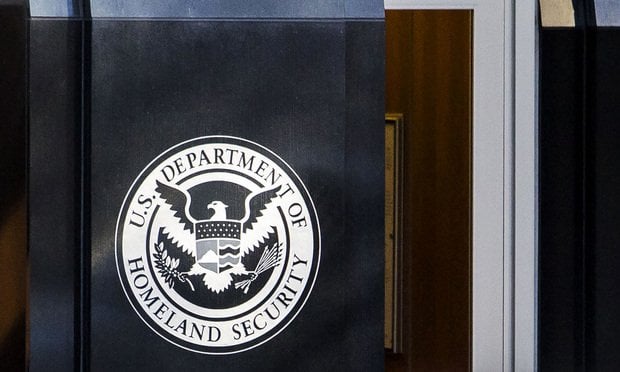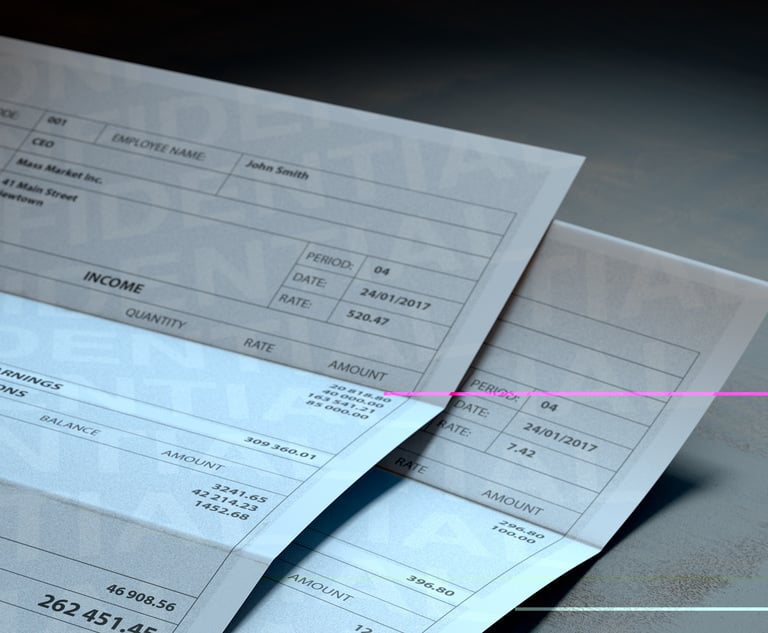DHS Ordered to Reopen Petitions From Young Immigrants Seeking Protections
U.S. District Judge John Koeltl finalized his March 15 summary judgment order, laying out how federal immigration authorities were to remediate the improper denials of petitions filed by young, at-risk immigrants.
April 09, 2019 at 02:46 PM
5 minute read
 U.S. Department of Homeland Security building in Washington, D.C. Photo: Diego M. Radzinschi/ALM
U.S. Department of Homeland Security building in Washington, D.C. Photo: Diego M. Radzinschi/ALM
The Department of Homeland Security must reverse course on changes to a humanitarian immigration relief program for abandoned and abused young people, under an order issued by U.S. District Judge John Koeltl of the Southern District of New York Tuesday.
The district court found the department was in violation of federal law when it made unannounced changes in early 2018 to its handling of special immigrant juvenile petitions coming out of New York State family courts. The order laid out the details of how federal immigration authorities were to handle previously denied petitions, while demanding going forward they refrain from deviating from policies that were in place before 2018.
Immigration legal advocates hailed the district court's order as a major win, correcting the federal government's actions.
“This order is a huge step for our clients and others who were unlawfully and arbitrarily denied vital humanitarian status,” Beth Krause, supervising attorney of the Immigrant Youth Project at The Legal Aid Society, said in a statement. “Immigrant youth who reside in New York State and who survived abuse, abandonment, or neglect will now be put on a path towards securing a green card.”
On Tuesday, Koeltl finalized the findings in a March 15 summary judgment order. In that decision, the district court determined that DHS was in violation of the federal Administrative Procedure Act when it refused to recognize so-called special finding orders issued by state family court judges that established the eligibility of juvenile immigrants between the ages of 18 and 21 to obtain protective status.
Koeltl issued declaratory and injunctive relief, finding DHS' conclusion that New York's family courts lacked jurisdiction and authority to enter findings for young adult immigrants violated the SIJ federal statute.
Additionally, the district court found DHS' parental reunification powers policy it placed on juvenile courts as a requirement before the department was willing to accept a special immigration juvenile petition as complete also contravened the federal immigration law.
Now, the class of young immigrants certified by Koeltl in March will be allowed to reopen their cases if previously denied because of DHS' policies, as well as barring DHS from denying petitions that included determinations from New York family courts.
A spokesman for DHS did not comment on the decision. A spokeswoman for the U.S. Attorney's Office for the Southern District of New York, which handled the case for the government, declined to comment.
DHS' alleged policy changes in early 2018 came as a shock to the four plaintiffs in the case. In the amended complaint filed in August, the four plaintiffs claimed to have sought special protection under the Special Immigrant Juvenile Status program created by Congress in 1990. The four 18- to 20-year-old immigrants claimed an array of issues, from family abandonment to fleeing violence in their home countries.
According to the plaintiffs, each would have been eligible for SJIS, and placed on a path to legal residency and citizenship. Instead, U.S. Citizenship and Immigration Services denied the plaintiffs and allegedly hundreds more applications, on the previously unheard of basis that New York's family courts lacked authority under state law on child welfare issues, according to the complaint.
Specifically, the plaintiffs claim, federal authorities decided the state family courts no longer qualified as “juvenile courts” as defined by the Immigration and Nationality Act, because they have no jurisdiction over young adults under 21 years of age. Second, the family courts also lacked the authority to reunify SJIS applicants in that age range with a parent.
The plaintiffs challenged DHS' interpretation of the law, claiming the text of the law doesn't support the department's new reading, but, even if they did, that New York State law provides the family courts such authority. In March, Koeltl agreed, granting the summary judgment motion by the plaintiffs.
In his order, Koeltl said DHS was obligated to handle the class members' claims within three years, while specifically noting that the department was under “continuing obligation not to violate the law” going forward. Regular compliance status reports were ordered to be filed with the court, the judge ordered.
The plaintiffs were represented by attorneys from The Legal Aid Society and Latham & Watkins, led by partner Robert Malionek. In a statement, he praised the court's decision.
“We filed this lawsuit last year with the simple goal of enforcing the law on behalf of the most vulnerable of populations. Today, we are thrilled to have achieved that goal in full. Immigrant youth who have been mistreated or abandoned by a parent can now obtain the immigration status to which they are entitled,” Malionek said.
Related:
Official Broke Law in Curbing Protections for Haitian Immigrants, Ex-Agency Head Says
This content has been archived. It is available through our partners, LexisNexis® and Bloomberg Law.
To view this content, please continue to their sites.
Not a Lexis Subscriber?
Subscribe Now
Not a Bloomberg Law Subscriber?
Subscribe Now
NOT FOR REPRINT
© 2025 ALM Global, LLC, All Rights Reserved. Request academic re-use from www.copyright.com. All other uses, submit a request to [email protected]. For more information visit Asset & Logo Licensing.
You Might Like
View All
Five Years After Vega Much Remains Unsettled in Pay Frequency Litigation

Spotify GC Steps Down, Opts to 'Step Away From Full-Time Corporate Life'
2 minute read
Dechert Sues Former Attorney For Not Returning Compensation

Trending Stories
- 1Law Firms Report Wide Growth, Successful Billing Rate Increases and Less Merger Interest
- 2CLOs Face Mounting Pressure as Risks Mushroom and Job Duties Expand
- 3X Faces Intense Scrutiny as EU Investigation Races to Conclusion & Looming Court Battle
- 4'Nation Is in Trouble': NY Lawmakers Advance Bill to Set Parameters for Shielding Juror IDs in Criminal Matters
- 5Margolis Edelstein Broadens Leadership With New Co-Managing Partner
Who Got The Work
J. Brugh Lower of Gibbons has entered an appearance for industrial equipment supplier Devco Corporation in a pending trademark infringement lawsuit. The suit, accusing the defendant of selling knock-off Graco products, was filed Dec. 18 in New Jersey District Court by Rivkin Radler on behalf of Graco Inc. and Graco Minnesota. The case, assigned to U.S. District Judge Zahid N. Quraishi, is 3:24-cv-11294, Graco Inc. et al v. Devco Corporation.
Who Got The Work
Rebecca Maller-Stein and Kent A. Yalowitz of Arnold & Porter Kaye Scholer have entered their appearances for Hanaco Venture Capital and its executives, Lior Prosor and David Frankel, in a pending securities lawsuit. The action, filed on Dec. 24 in New York Southern District Court by Zell, Aron & Co. on behalf of Goldeneye Advisors, accuses the defendants of negligently and fraudulently managing the plaintiff's $1 million investment. The case, assigned to U.S. District Judge Vernon S. Broderick, is 1:24-cv-09918, Goldeneye Advisors, LLC v. Hanaco Venture Capital, Ltd. et al.
Who Got The Work
Attorneys from A&O Shearman has stepped in as defense counsel for Toronto-Dominion Bank and other defendants in a pending securities class action. The suit, filed Dec. 11 in New York Southern District Court by Bleichmar Fonti & Auld, accuses the defendants of concealing the bank's 'pervasive' deficiencies in regards to its compliance with the Bank Secrecy Act and the quality of its anti-money laundering controls. The case, assigned to U.S. District Judge Arun Subramanian, is 1:24-cv-09445, Gonzalez v. The Toronto-Dominion Bank et al.
Who Got The Work
Crown Castle International, a Pennsylvania company providing shared communications infrastructure, has turned to Luke D. Wolf of Gordon Rees Scully Mansukhani to fend off a pending breach-of-contract lawsuit. The court action, filed Nov. 25 in Michigan Eastern District Court by Hooper Hathaway PC on behalf of The Town Residences LLC, accuses Crown Castle of failing to transfer approximately $30,000 in utility payments from T-Mobile in breach of a roof-top lease and assignment agreement. The case, assigned to U.S. District Judge Susan K. Declercq, is 2:24-cv-13131, The Town Residences LLC v. T-Mobile US, Inc. et al.
Who Got The Work
Wilfred P. Coronato and Daniel M. Schwartz of McCarter & English have stepped in as defense counsel to Electrolux Home Products Inc. in a pending product liability lawsuit. The court action, filed Nov. 26 in New York Eastern District Court by Poulos Lopiccolo PC and Nagel Rice LLP on behalf of David Stern, alleges that the defendant's refrigerators’ drawers and shelving repeatedly break and fall apart within months after purchase. The case, assigned to U.S. District Judge Joan M. Azrack, is 2:24-cv-08204, Stern v. Electrolux Home Products, Inc.
Featured Firms
Law Offices of Gary Martin Hays & Associates, P.C.
(470) 294-1674
Law Offices of Mark E. Salomone
(857) 444-6468
Smith & Hassler
(713) 739-1250






